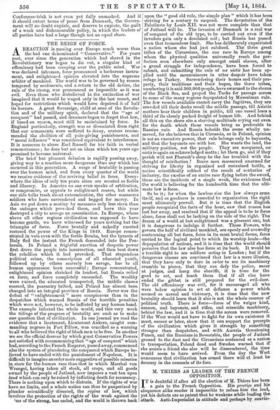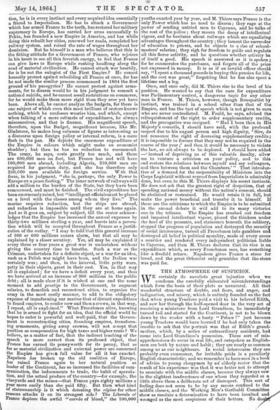M. TRIERS AS LEADER OF THE FRENCH OPPOSITION.
IT is doubtful if after all the election of M. Thiers has been a gain to the French Opposition. His prestige and his- eloquence alike render it impossible to refuse him the lead, yet his defects are so patent that he weakens while leading the attack. Anti-Imperialist in attitude and perhaps by convic- tion, he is in every instinct and every acquired idea essentially a friend to Imperialism. He has to attack a Government which has armed France to the teeth, has restored her military supremacy in Europe, has carried her arms successfully to Pekin, has founded a new Empire in America, and has while doing this rebuilt her cities, renewed her roads, completed her railway system, and raised the rate of wages throughout her dominion. But he himself is a man who believes that -this is the fitting attitude for a Government of France, who rejoices in his heart to see all this feverish energy, -to feel that France can give laws to Europe while rushing headlong along -the road of material civilization. He cannot attack war heartily, for is he not the eulogist of the First Empire ? He cannot honestly protest against rebuilding all France at once, for has he not made the similar process commenced in 1804 the first ground of his panegyrics? He cannot protest against arma- ments, for to disarm would be in his judgment to commit a national suicide, and he cannot assail restrictions on commerce, for he would make them more rigid than they ever yet have been. Above all, he cannot analyze the budgets, for there is one subject of which even this most brilliant of orators knows nothing, which he confesses wearies him, and which, except when talking of a mere estimate of expenditures, he always misconceives, and that is finance. His magnificent speech, therefore, upon the Budget, magnificent because, like Mr. Gladstone, he makes long columns of figures as interesting as a discourse upon foreign policy or internal reform, is a mere flash in the pan. He depicts the enormous expenditure of the Empire in colours which might make an economist shudder ; but then he has no reduction to recommend. The army, he says, costs greatly too much, and there are 600,000 men on foot, but France has and will have 100,000 men abroad, including Algeria, 2'50,000 men are required for garrison duty, and she has therefore only 250,000 men available for foreign service. With that force, in his judgment, "she is, perhaps, the only Power in Europe on a peace footing." The inner network of railways will add a million to the burden of the State, but they have been commenced, and must be finished. The civil expenditure has been enormouslyraised, but "intelligent officials must be placed on a level with the classes among whom they live." The marine requires reduction, but the ships are abroad, and reduction is impossible until they are at home again. And so it goes on, subject by subject, till the orator acknow- ledges that the Empire has increased the annual expenses by thirty-two millions sterling a year, and bursts into a perora- tion which will be accepted throughout France as a justifi- cation of the outlay. "I may be told that this general increase of 500 or 600 millions causes alarm, but that all may be explained by a closer scrutiny. Yes, all may be explained if every three or four years a great war is undertaken without giving the country time to breathe. Such a war as the Crimean, undertaken for a definite object, or a war for an idea, such as a Polish war might have been, and the Italian war certainly was ; and then, in the interval, little petty wars, petty in their objects, great in their cost. Yes, in that way all is explained ; for we have a deficit every year, and thus we have arrived at an increase of 'BOO millions in the public debt; all is made clear if it is wished at one and the same moment to add prestige to the Government, to augment salaries, to demolish and reconstruct cities, to organize the army in the most costly manner, to add to the obligatory expense of transforming our marine that of distant expeditions to found empires, to confer now and then a crown, in that way, I repeat, all is explained." What Frenchman alive, knowing that he is armed to fight for an idea, that the official world he hopes to enter is powerful and well-paid, that the Govern- ment is reconstructing cities, founding empires, transform- ing armaments, giving away crowns, will not accept that position as compensation for high taxes and higher rents ? We believe, as a matter of fact, that the indirect teaching of the speech is more correct than. its professed object, that France has earned its pennyworth for its penny, that as far as material civilization and external power are concerned the Empire has givat full value for all it has exacted. Napoleon has broken up the old coalition of Europe, has raised France again to her natural position as leader of the Continent, has so increased the facilities of com- munication, the inducements to trade, the habit of specula- tion, and the actual produce of the country—for example, the vineyards and the mines—that France pays eighty millions a year more easily than she paid fifty. But then what kind of statesmanship is it which detesting the regime for other reasons attacks it on its strongest side ? The Liberals of France deplore the awful " corvee of blood," the 100,000 youths exacted year by year, and M. Thiers says France is the only Power which has no need to disarm ; they rage at the power of sending untried men to Cayenne, and he talks of the cost of the police ; they mourn the decay of intellectual vigour, and he hesitates about railways which are equalizing advantages throughout the country ; they lament the surrender of education to priests, and he objects to a rise of school- masters' salaries; they sigh for freedom to guide and regulate all this 'fierce activity, and he questions whether activity be of itself a good. His speech is answered as it is spoken ; for he enumerates the purchases, and forgets all of the price not expressed in money. It is as if an invalid officer should say, "I spent a thousand pounds in buying this pension for life, and the cost was great," forgetting that he has also spent a lifetime and a leg.
Once, and once only, did M. Thiers rise to the level of his position. He wanted to say that the cure for expenditure was Parliamentary control, a dangerous topic for any other man in France. M. Thiers, however, though Bonapartist by instinct, was trained in a school other than that of the Empire, and has the tact of speech which is not given to men who are never contradicted. M. Fould, he says, advised the relinquishment of the right to order supplementary credits, and the prerogative was resigned. "Had I been then in His Majesty's councils, I should have said, with the profound respect due to his august person and high dignity, Sire, do not renounce the right of decreeing supplementary credits; it is impossible to foresee that they may not be required in the course of the year ;' and then it would be necessary to violate the law, an act always to be deplored. I should have added = instead of depriving us of this valuable faculty, allow me to venture a criticism on your policy, and to this . end, restore the relations between myself and my colleagues, and then between them and the Chambers.'" -That introduc- tion of a demand for the responsibility of Ministers into the Corps Legislatif without reproof from Imperialists is admirably done, but even in this M. Thiers displays his secret instincts. He does not ask that the greatest right of despotism, that of spending national money without the nation's consent, should be abolished or restrained. He would retain it in full, but make the power beneficial and transfer it to himself. If these are the criticisms to which the Empire is to be submitted in the annual debate it will add to its many victoriet one in the tribune. The Empire has crushed out freedom and impaired intellectual vigour, placed the thinkers under the heel of the peasants, and statesmen beneath the soldiery, stopped the progress of population and destroyed the security of social intercourse, turned all Frenchmen into gamblers and destroyed all belief in political morality, made of every sawn a courtier and rendered every independent politician liable to Cayenne, and then M. Thiers declares that its vice is an expenditure which, as every Frenchman sees, has something like a fivefold return. Napoleon gives France a stone for bread, and the great Orleanist only grumbles that the stone was paid for.































 Previous page
Previous page